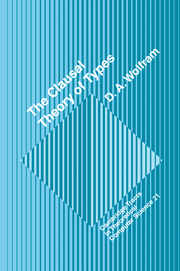
-
Select format
-
- Publisher:
- Cambridge University Press
- Publication date:
- January 2010
- April 1993
- ISBN:
- 9780511569906
- 9780521395380
- 9780521117906
- Dimensions:
- (247 x 174 mm)
- Weight & Pages:
- 0.406kg, 134 Pages
- Dimensions:
- (244 x 170 mm)
- Weight & Pages:
- 0.23kg, 136 Pages
You may already have access via personal or institutional login
Book description
Logic programming was based on first-order logic. Higher-order logics can also lead to theories of theorem-proving. This book introduces just such a theory, based on a lambda-calculus formulation of a clausal logic with equality, known as the Clausal Theory of Types. By restricting this logic to Horn clauses, a concise form of logic programming that incorporates functional programming is achieved. The book begins by reviewing the fundamental Skolem-Herbrand-Gödel Theorem and resolution, which are then extrapolated to a higher-order setting; this requires introducing higher-order equational unification which builds in higher-order equational theories and uses higher-order rewriting. The logic programming language derived has the unique property of being sound and complete with respect to Henkin-Andrews general models, and consequently of treating equivalent terms as identical. First published in 1993, the book can be used for graduate courses in theorem-proving, but will be of interest to all working in declarative programming.
Contents
Metrics
Altmetric attention score
Full text views
Full text views help Loading metrics...
Loading metrics...
* Views captured on Cambridge Core between #date#. This data will be updated every 24 hours.
Usage data cannot currently be displayed.
Accessibility standard: Unknown
Why this information is here
This section outlines the accessibility features of this content - including support for screen readers, full keyboard navigation and high-contrast display options. This may not be relevant for you.
Accessibility Information
Accessibility compliance for the PDF of this book is currently unknown and may be updated in the future.


